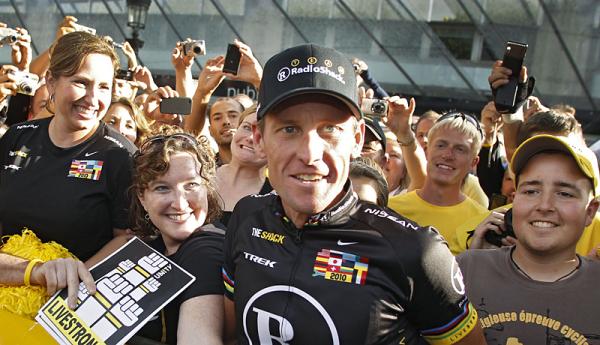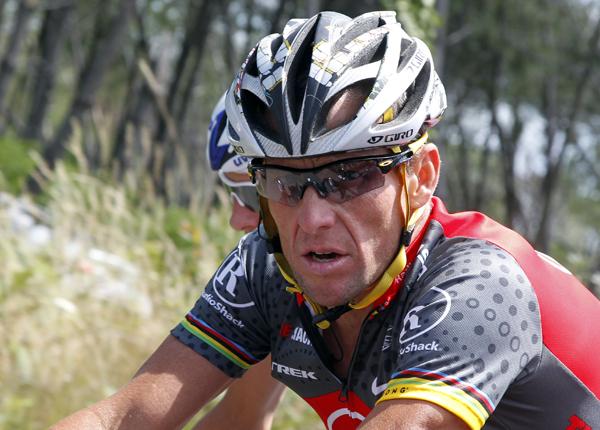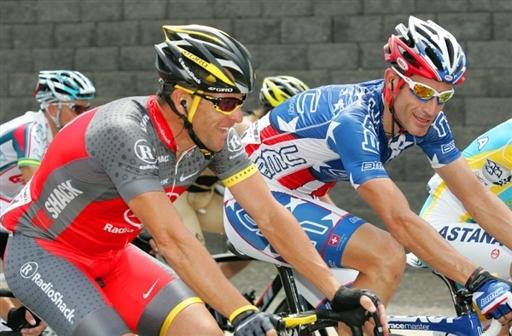Lance Armstrong on defensive in federal investigation
Legal team met with US attorney



"All we know about the investigation is what we read in the paper," Lance Armstrong's attorney Tim Herman told Cyclingnews last week. That statement seemed hard to believe, since Hermans had days earlier been in a face-to-face meeting with the US Attorney Andre Britton, a meeting his legal team described as "an attempt to open a dialogue" between the team and the government of the United States.
Landis confesses to doping, implicates Armstrong and Bruyneel
Armstrong lawyer condemns "un-American" investigation
Landis files whistle-blower lawsuit
Lance Armstrong support website faces backlash
Landis to appear at anti-doping conference in Geelong
Bordry prepared to hand over Armstrong's 1999 Tour de France samples
That dialogue centers around a federal investigation, led by the Food and Drug Administration's Jeff Novitsky, into ... well, into something having to do with doping and cycling, but nobody is saying exactly what. Everything about the case is being handled under strict secrecy, and only the subpoenas given out can hint of the grand jury's direction. And only time will tell if they decide to file any charges.
If Armstrong and his lawyers only know what the feds are doing based on what they read in the paper, it's no wonder he's beefed up his legal team with Bryan Daly, a high-powered Los Angeles lawyer who was himself once a federal prosecutor who worked at the exact same US Attorney's office currently in charge of the grand jury probe.
It's no wonder he's hired Mark Fabiani as his spokesman. Fabiani, nicknamed the "Master of Disaster", has represented clients such as President Bill Clinton during the Whitewater scandal and more recently worked to repair the image of investment bank Goldman Sachs.
It seems like Armstrong is taking the case pretty seriously, having stepped out of the spotlight completely after the Tour de France to let his experts handle the press. The extremely pricey representation is purely preventive, according to his long-time attorney Herman. "It would be imprudent for Mr. Armstrong not to have people monitoring the situation, and if there is, which I am confident there won't be, but if there are any charges filed, it would be pretty irresponsible not to have representation ready to go."
It has become widely accepted that the investigation is partially centered around claims made by Floyd Landis, the disgraced 2006 Tour de France champion who, after years of denying doping to win that race, came out with a full confession that implicated many of his former teammates. But rather than a subject, Landis appears to be a cooperating witness to the investigation.
With his own confessions, he pointed the finger squarely at Armstrong, issuing statements containing a level of detail into alleged team-wide doping practices that was so fine it caught the eye of the UCI's own biological passport panel, which is now looking into how the information can help them catch more cheaters.
The latest race content, interviews, features, reviews and expert buying guides, direct to your inbox!
Charges have yet to be filed, and according to the Associated Press, it could be a long time before the world learns what the grand jury has assembled.
"If you are going after someone with the stature of Armstrong, you don't rush into this," Laurie Levenson, a professor at Loyola Law School in Los Angeles and a former federal prosecutor told AP. "You want to make sure you cover all your bases. it seems to me there is plenty of work to do."
"[Landis's] words are only good as the corroboration you have for them," Levenson said. "Other than Landis, who is on the inside and can help as well? If they have another person, it would speed up the process."
Possible corroborators
Other people who have been contacted by the investigators include Armstrong's former teammates Tyler Hamilton and George Hincapie, sponsors Trek Bicycle Corp. and Nike and three-time Tour champion and frequent Armstrong detractor Greg LeMond.
LeMond's lawyer told the Associated Press that some 70,000 pages of documents were handed over, some of which relate to testimony given by Betsy Andreu and her husband, Armstrong's former teammate Frankie Andreu, who believe that in 1996 they heard Armstrong admit to doping in response to a doctor's inquiry while he was being treated for cancer.
They have now spoken with the federal investigators, presumably to rehash the now famous "hospital room conversation". Last week, Betsy Andreu spoke with Cyclingnews, and confirmed that she spoke with the investigators voluntarily, but said she could not go into specifics.
In 2005, she testified at the contract dispute between SCA promotions and Lance Armstrong, stating with conviction that she heard Armstrong confess to using a number of performance enhancing drugs. SCA was trying to get out of paying Armstrong a bonus for winning his fifth consecutive Tour de France based on information in the book L. A. Confidentiel : Les secrets de Lance Armstrong, which first brought the hospital room conversation to light.
The conversation has been used in two separate lawsuits, neither one of which has resulted in a court punishing Armstrong, but this is the first time that the topic has been the focus of a possible criminal investigation, and Armstrong's camp has been on the defensive.
Fabiani issued a statement saying, "This old, discredited story is being regurgitated by people trying to legitimize what is clearly a fishing expedition that is wasting millions in taxpayer money and misusing FDA resources. The hospital story was long ago proven to be fictional - by a sworn statement from Lance's doctor, by hundreds of pages of medical records, and by the others in the room that day."
Armstrong won a $7.5 million award in that case, but sources familiar with the case have suggested that technicalities with the SCA contract were the reason for the award, not because the panel dismissed the doping allegations. The lead arbiter in the case, Richard Faulkner, told Cyclingnews he couldn't state what influenced the panel's decision, but said the award speaks for itself, and added that anyone who suggests that Ms. Andreu's testimony wasn't considered [and, presumably, discredited] in the award "has an agenda".
Herman called Andreu's story "completely implausible", but Andreu is unbowed in her conviction that she is the one telling the truth. "I stand by what I've always said. I told the truth. If Lance or his people are going to say that this is 'fictional', that I've been discredited - by whom? By a PR firm that gets paid to represent Lance?"
"I've never lied about anything, and it's ludicrous for people to expect me to be a door mat and have aspersions cast upon me for refusing to tell a lie."
What is certain is that the federal grand jury will gather much more than just the "he said, she said" about a 14-year-old conversation. They could try to find someone willing to back up the Andreu's statements, or try to get Armstrong's former teammates to corroborate Landis's claims.
However, Herman is not concerned that the feds will find that Armstrong committed perjury during the SCA case when he denied having doped, nor is he worried that Armstrong will face criminal charges. "There's never been an athlete that has been criminally prosecuted for violating a rule of his sport."
"He's the most extensively tested athlete of all time, he's passed every test. And that seems to me to be the most compelling evidence of how he's conducted his career. He's obviously an athlete that comes along every couple of generations. It's tragic that resources would be extended on this when he's a guy who's done so much good."

Laura Weislo has been with Cyclingnews since 2006 after making a switch from a career in science. As Managing Editor, she coordinates coverage for North American events and global news. As former elite-level road racer who dabbled in cyclo-cross and track, Laura has a passion for all three disciplines. When not working she likes to go camping and explore lesser traveled roads, paths and gravel tracks. Laura specialises in covering doping, anti-doping, UCI governance and performing data analysis.